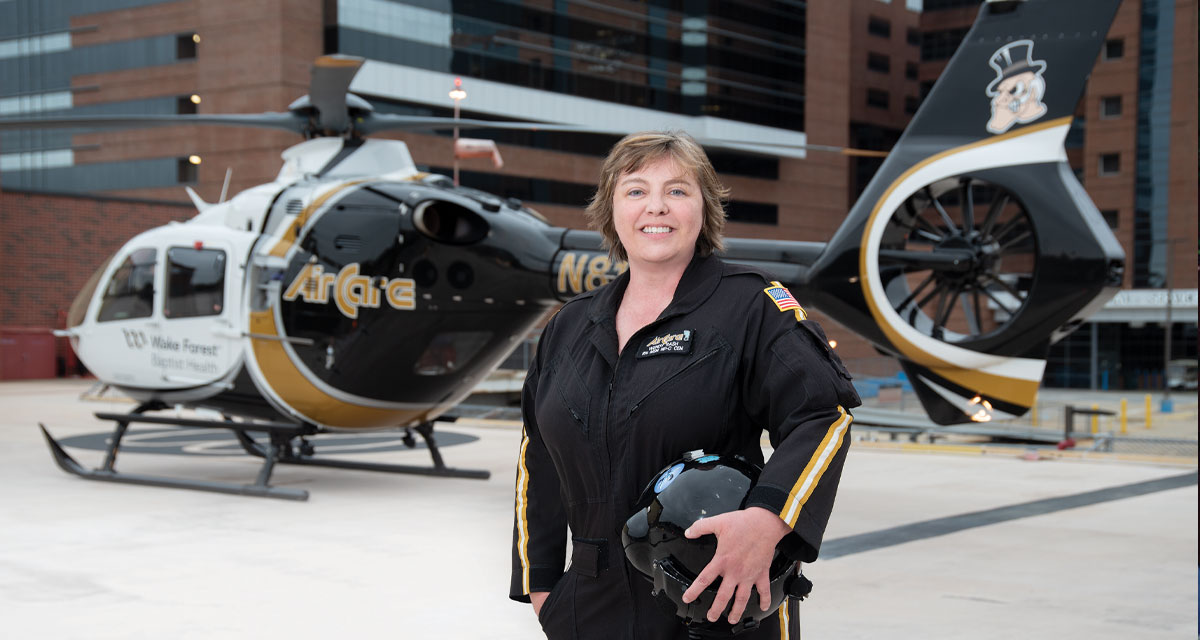Wendy Rash, a self-described “go-getter,” is no stranger to heart surgery. The Lewisville resident has had a number of procedures over the years to address her irregular heartbeat.
Now in her late 40s and on her third pacemaker, she has trusted her heart care to Wake Forest Baptist Health for more than 20 years. She has worked with the health system since the early 1990s, first as a nursing assistant and later as a flight nurse on the AirCare helicopter crew for about 20 years. She’s now a nurse practitioner in interventional radiology and still works with AirCare.
When she was diagnosed in 2018 with a heart valve that needed repair, she chose to have minimally invasive open-heart surgery, which was performed by Drs. Ted Kincaid, Tony Simmons and Patrick Whalen.
She chose that surgery because of its shorter recovery time. She knows Wake Forest Baptist offers the full range of cardiovascular care, from preventive to advanced and everything in between, and she understands what it means to provide the best care. She says her background in medicine helped her grasp the importance of choosing a care team with specialized training who teach that care to others.
“I knew the Heart and Vascular Center was well-established and worked to build excellent relationships with their patients, and I knew the doctors would put my best interests first,” says Wendy, who first experienced heart issues in her mid-20s and got her first pacemaker at 31.
When she learned one of her heart valves would need to be replaced within months, she wanted to take care of it sooner rather than later.
“Mostly because of my activity level and the things that I do—lifting, chasing after my two dogs—I felt like I would have a better recovery path with minimally invasive surgery,” she says.
Her surgery was a success, and her follow-up treatment, from intensive care to the cardiac floor and through cardiac rehabilitation, exceeded her expectations.
“They were compassionate and understanding, yet pushed me to get up and out of bed when I didn’t think I could,” she says. “They have been amazing every step of the way. I owe them everything!”
Her recovery was exactly what she had hoped for—she was back at work 21⁄2 weeks after surgery. She feels 100 percent better, with no symptoms, a higher energy level, increased endurance and no limitations.
“I wish I had done it sooner,” Wendy says. “You don’t realize how bad you feel until you feel a whole lot better.”
PREVENTIVE CARDIOLOGY: ANEMERGING SUBSPECIALTY
Signs of cardiovascular disease — the world’s leading cause of death — often go undetected until it is too late. A new center at Wake Forest Baptist Health, dedicated to the emerging subspecialty of preventive cardiology, aims to make a difference.
“Only half of people are fortunate enough to have signs and symptoms that suggest that they may have underlying cardiovascular disease before they have a catastrophic event,” says Michael D. Shapiro, DO, MCR, a board-certified cardiologist who is directing Wake Forest Baptist Health’s new Center for the Prevention of Cardiovascular Disease.
“The other half actually have a major event, such as heart attack or sudden cardiac death, as their first sign or symptom.”
Preventive cardiologists can evaluate apparently healthy individuals for their risk of heart disease and identify some of the earliest signs and/or risk for cardiovascular disease.
“We actually have good tools to do that now,” Shapiro says. Those tools include a range of new technology and diagnostic methods, such as advanced cardiac imaging, cutting- edge laboratory testing and genetics.
Preventative Cardiology: An Emerging Subspecialty
For women, Shapiro says there are several facts they should be aware of:
- Heart disease is not a “man’s disease.” It kills 10 times as many women as breast cancer.
- At menopause, the risk for heart disease goes up for women and approaches that of men.
- Women sometimes have atypical symptoms, not necessarily the classic ones. These need to be evaluated by a provider to make sure they are not indicative of heart disease.
- Screening for early heart disease with imaging, such as a coronary artery calcium score, is just as effective in women as it is in men.He says many deaths attributable to cardiovascular disease are easily preventable.
“If you can find who is at risk and you can offer them good options, both in terms of lifestyle changes and medical treatment,” Shapiro says, “it can go a long way toward preventing a lot of misery down the road.”


















